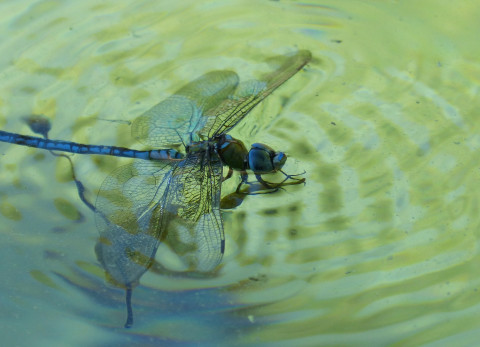Common insecticide linked to extreme decline in freshwater insects

Common insecticide linked to extreme decline in freshwater insects
Thiacloprid, a widely-used pesticide, can cause a large-scale decline in freshwater insects. This was discovered by a team of researchers from Leiden University, including current NIOO-director Geert de Snoo. Over a three-month period, they counted flying insects in the Living Lab in Leiden. Their research has now been published in the latest issue of PNAS.
In 36 ditches in the Living Lab, the researchers exposed freshwater insects to different concentrations of thiacloprid. It's a substance belonging to the world's most widely-used group of insecticides: neonicotinoids.
"We used realistic concentrations,' says researcher Henrik Barmentlo. "They correspond to concentrations we actually measure in the surface water."
Dramatic decline in all species
That neonicotinoids can be harmful to many insects, had already been proven. But there was no conclusive evidence yet that these insecticides are at least partly responsible for the large-scale decline in insect numbers.
In a unique experiment that started in 2018, the researchers caught no fewer than 55,574 insects that flew out of the lab's 36 thiacloprid-contaminated ditches over a three-month period. Afterwards, they identified all specimens. They compared the results with nine control ditches, without added thiacloprid.
Barmentlo: "We saw dramatic declines in all the species groups studied, such as dragonflies, beetles and caddisflies. Both in absolute numbers and in total biomass. In the most extreme scenario, the diversity of the most species-rich group, the dance flies, even dropped to a single species."
Consequences for the whole ecosystem
These are insects that have an important role in their ecosystem. For example, they serve as food for many insect-eating bird species. Previously, other researchers had already discovered that these bird species occur in lower numbers when there are more neonicotinoids in the water. Barmentlo: "It is quite possible that these bird species suffer from a lack of insects, or in other words: food."
The researchers calls the results alarming. "Given the urgency of the large-scale decline in insects, we think the mass use of these insecticides should be reconsidered." In the EU, the use of thiacloprid was banned last year, but not yet in other parts of the world. "In order to protect freshwater insects and all the life that depends on them, we must stop using these neonicotinoides as soon as possible."
(Source: Leiden University)

